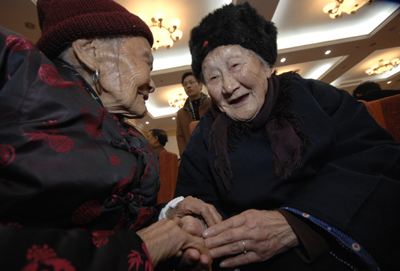144 million elders wait for government care
By Guo Qiang (chinadaily.com.cn)Updated: 2007-01-10 17:13
Li Aiying has lots of good things to say about China's Collaboration Medical System. The 73-year-old Shandong resident received a reimbursement of 11,000 yuan (US$1410) from the local village committee, accounting for half of her heart operation bill.
 Xu Fuming (L), 102, and Sun Wen, 100, talk with each other during a get-together in Xiangfan, Central China's Hubei Province January 9, 2007. [Newsphoto]  |
Li is one of the country's 144 million elders over 60 who are challenged with the cumbersome issue of how to cope with risky diseases in the face of skyrocketing medical costs.
The plight of the elderly is also a government concern. Last year it released a white paper on he country's thorny aging population issue.
China is facing increasing pressure, especially economic pressure, from its growing ageing population. The number of people over 60 has swelled to 144 million, accounting for half of all those over 60 in Asia and one fifth of the world's total. The population of people over 60 in China is growing by nearly six million a year.
The government is expected to have to deal with 248 million elderly by 2020, Li Bengong, President of the China National Committee on Ageing was quoted as saying by Xinhua News Agency.
Li says the situation is much tougher in China than other countries. "The per capita GDP has just reached 1,000 US dollars and China is in a vulnerable position in terms of dealing with the elderly," Li said.
Around 2035 to 2040, forecast to be the peak of China's aging problem, the country will face a social security deficit of $128 billion a year, Li told the Washington Post.
As the cradle-to-grave welfare system associated with state-owned factories has been thrown into the rubbish bin of history, a piece of news that will have China's colossal ageing population breath a sigh of relief is that the government has promised to establish a sound ageing insurance system. The number of beneficiaries from the helpful system has jumped to 17.5 million.
The elderly consumed three-fold more in medical insurance funds than others, putting great pressure on insurance funds, state media reported. The official figure states that a total of 404 billion yuan has been poured into the system and the government has promised to allocate more.
Wu Bei, a scholar who studied China's aging issues at the United States Department of Medicine at the University of West Virginia Aging Center said the solution to the social problems that stem from aging lie in economics.
"China must first improve the country's economic strength before it will have the ability to better help the elderly," he said.
Experts have blamed the one-child policy for the gigantic ageing population.
Hu An'gang, director of the School of Public Policy and Management at Tsinghua University even proposed allowing couples to have a second child and to give birth at an older age in an effort to ease the pressure produced by the controversial policy.
Yu Xuejun, director of the policy and legislative department of the State Population and Family Planning Commission is one of the dissidents.
"Family planning may not be perfect," Yu said, "but it will be a long-term fundamental national policy for the most populous country in the world."
|
||
|
||
|
|